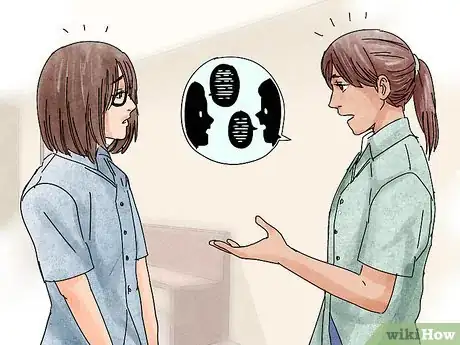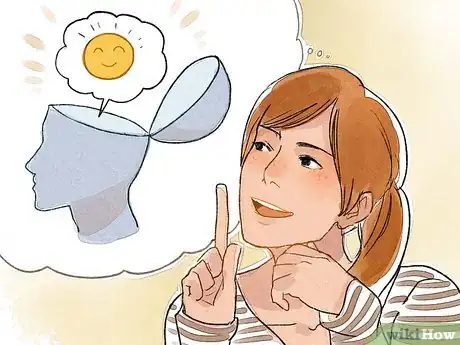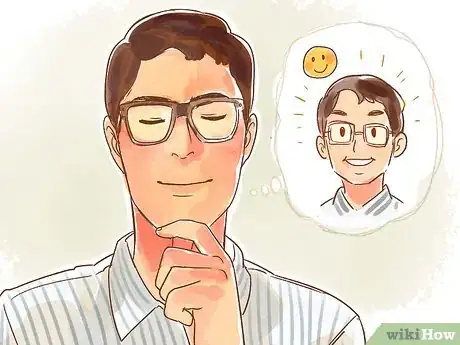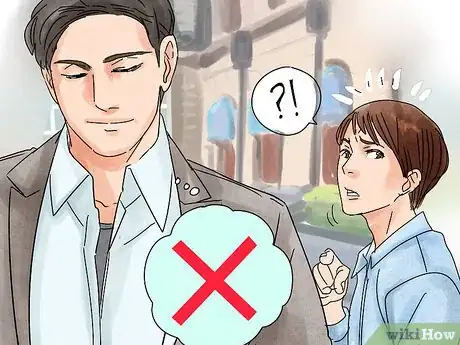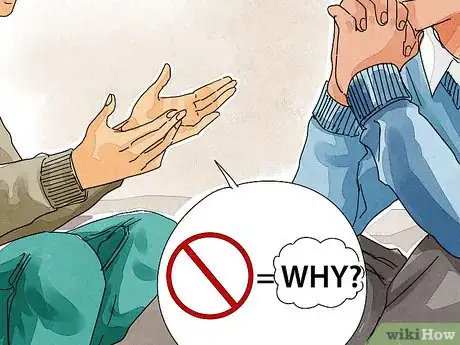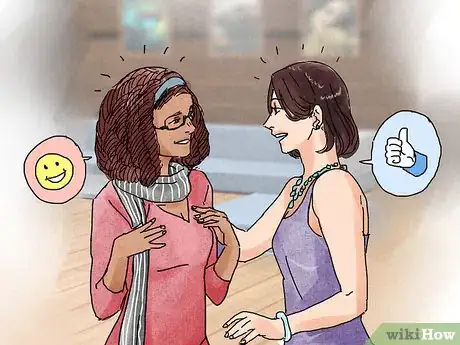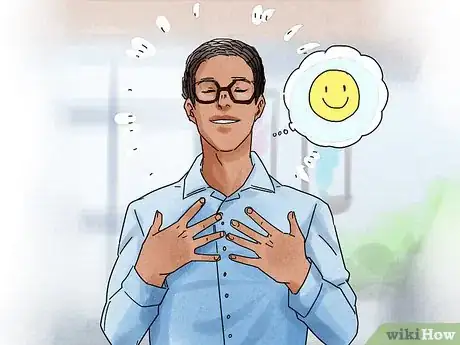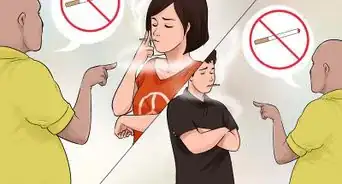This article was co-authored by Ashlyne Mullen, PsyD. Dr. Ashlyne Mullen is a Licensed Clinical Psychologist based in New York City. She specializes in helping people through chronic illness, anxiety, depression, grief, insomnia, personal growth, and relationships. Dr. Mullen holds a PsyD in Clinical Psychology, an MS in Applied Psychology, and an MA in Educational Psychology. She has extensive training in Acceptance and Commitment Therapy (ACT), Cognitive Behavioral Therapy (CBT), Radically Open Dialectical Behavior Therapy (RO-DBT), Functional Analytic Psychotherapy (FAP), and other mindfulness-based interventions.
There are 8 references cited in this article, which can be found at the bottom of the page.
This article has been viewed 32,528 times.
Feeling like you are overlooked more often than being actually seen can take a real toll on your self-esteem.[1] No one likes to be ignored, particularly when you feel like you're not getting the recognition you deserve. You can cope with feeling overlooked by taking responsibility for your role, taking steps to become more noticeable, and caring for yourself.
Steps
Taking Responsibility for Your Role
-
1Speak up. You are the best person for the job when it comes to defending yourself. Let others know when you feel like you are being taken advantage of or being treated unkindly. You are less likely to be walked all over if you begin speaking out about what you don't like. This is because you can teach other people how you want to be treated. That means that if you tell people when something bothers you, then they will be less likely to repeat the behavior.
- For instance, if someone doesn't acknowledge you when they need help, you could say, “I can handle the task you are talking about. I'd love to help you out.” By speaking in this way, you are coming off as friendly and willing to help, instead of being cocky and self-centered about it.[2]
-
2Change your perspective. If you really feel you're being overlooked, then you should take action. But for minor offenses, changing your outlook on the situation can make you feel much better about it. Be willing to let little things slide to avoid feeling offended when there is no offense. By simply readjusting your thought process, you may be able to stop feeling overlooked.
- For example, instead of thinking to yourself, “My friends never ask me to babysit their kids, but ask others,” you could say, “I'm glad my friends don't take advantage of me and pawn off their children off on me all of the time.”[3]
- Practicing gratitude is a great way to reframe your perspective in a healthy, balanced way.[4]
- Try thinking of times where your negative, self-doubting thoughts don't show up.[5]
- Remember—your negative thoughts are not real unless you start buying into them![6]
Advertisement -
3Examine your abilities. You may think you are always the best person for the job, but are never asked to do it. It could be because you're not as well-equipped for it as you think you are. Humility and honesty can be a difficult pill to swallow. However, they may help you understand why you are often overlooked.
- You can determine if your skills are lacking by asking the person what you can do to improve. If they can't offer any constructive criticism, there's a good chance you have an inaccurate opinion of your skills.[7]
-
4Consider whether your personality causes you to be ignored. A quiet and shy demeanor could be the reason you are overlooked. You may not put yourself out there enough, or people may think you just aren't interested.
- Try to become more involved with others if you believe your shyness is the reason for your exclusion. Talk more and step out of your comfort zone. You may find that you are no longer overlooked if you start making yourself more available.[8]
Making Yourself More Noticeable
-
1Ask why you are being overlooked. Pull the person aside who you feel is overlooking you and ask them about it directly. This is especially effective if you're feeling slighted in this way by your family and friends. Having an honest conversation about this can help you understand what is going on and possibly help you to feel better.
- Avoid being confrontational when addressing the person. You could say, “I feel like we aren't as close as we were before and I'm feeling left out of a lot of things. Do you feel like this, too?” Asking them how they feel gives them the opportunity to state their opinion, as well, so they don't feel like it is a one-sided conversation.[9]
-
2Treat others how you want to be treated. Show people your gratitude for them and tell them how much you appreciate them, often. Doing so may encourage them to do the same towards you. Give someone praise even if it is for something small. This can be particularly helpful for them, especially if they are feeling overlooked, also.
- Focusing on the good that others do may help you get your mind off of feeling overlooked. You may then start to realize how much others do, as well.[10]
- Be sure to include other people as well. This may increase the chances that they will include you in their plans in the future.
-
3Do it for you. Stop working so hard to get noticed. Instead, do it because you feel a sense of pride from it. Feeling good about yourself and the work you are doing can build your confidence and self-esteem.
- Over time, having this increased sense of pride in yourself could affect your personality and appearance, which could ultimately make you more noticeable.[11]
-
4Enhance your natural traits. You don't want to be someone you're not just to avoid being overlooked. You should feel comfortable being yourself, but it may also help to take it up a notch. Just be a little more outgoing, outspoken, or driven. Take a good look at yourself and figure out what really defines you. Then, try to enhance those traits.
- Talk to others about what you're passionate about or put a little more work into things you enjoy doing. The charismatic part of you will really shine and make it almost impossible for people to overlook you.[12]
Taking Care of Yourself
-
1Take it as a compliment. Being overlooked or not receiving the recognition you deserve can sometimes be a sign that you are dependable and typically do a good job. People may naturally expect great things from you. Therefore, you aren't always recognized for doing good.[13]
- The next time you are overlooked for praise, tell yourself, “This isn't about me not being good enough. It's about other people's insecurities about me.”
- Don't compromise your integrity by not being as good as you are just so you'll receive recognition. Stay true to yourself by being yourself.
- Keep in mind that not being singled out can be a positive thing. Not all attention is good attention.
-
2Make your feelings as important as everyone else's. People who are overlooked often care for everyone else but themselves. You can stop this by recognizing and caring for your feelings. You should also make yourself a priority: regard yourself with the same value as everyone else, if not more.
- By doing this you can stop yourself from being a doormat. People will learn to stop overlooking and taking advantage of you when you consider yourself just as important as them.[14]
- Value yourself by learning to say "no" to excessive demands and asking for help when you need it.
-
3Record your achievements. Write down when you do something well, particularly at work. Having concrete evidence of how well you're performing can help when it's time for a promotion and you believe you're going to be overlooked. You can show this to your boss when it's time for your review or when you have a meeting about your performance.
- Ask your boss to meet with you regularly to discuss how you're doing. Asking often shows that you are interested in doing well, which displays initiative and can put you at the forefront of your boss' mind the next time an opportunity occurs.[15]
- Be sure to praise yourself as well. Take a look at everything you have achieved and give yourself the praise you deserve even if no one else does. This can help to improve your motivation and self-esteem.
Expert Q&A
-
QuestionHow can I cope with being overlooked at work?
 Ashlyne Mullen, PsyDDr. Ashlyne Mullen is a Licensed Clinical Psychologist based in New York City. She specializes in helping people through chronic illness, anxiety, depression, grief, insomnia, personal growth, and relationships. Dr. Mullen holds a PsyD in Clinical Psychology, an MS in Applied Psychology, and an MA in Educational Psychology. She has extensive training in Acceptance and Commitment Therapy (ACT), Cognitive Behavioral Therapy (CBT), Radically Open Dialectical Behavior Therapy (RO-DBT), Functional Analytic Psychotherapy (FAP), and other mindfulness-based interventions.
Ashlyne Mullen, PsyDDr. Ashlyne Mullen is a Licensed Clinical Psychologist based in New York City. She specializes in helping people through chronic illness, anxiety, depression, grief, insomnia, personal growth, and relationships. Dr. Mullen holds a PsyD in Clinical Psychology, an MS in Applied Psychology, and an MA in Educational Psychology. She has extensive training in Acceptance and Commitment Therapy (ACT), Cognitive Behavioral Therapy (CBT), Radically Open Dialectical Behavior Therapy (RO-DBT), Functional Analytic Psychotherapy (FAP), and other mindfulness-based interventions.
Licensed Clinical Psychologist Practice doing deep breathing to help distance yourself from these negative thoughts. This can also help lower your overall anxiety.
Practice doing deep breathing to help distance yourself from these negative thoughts. This can also help lower your overall anxiety. -
QuestionHow can I feel less invisible?
 Ashlyne Mullen, PsyDDr. Ashlyne Mullen is a Licensed Clinical Psychologist based in New York City. She specializes in helping people through chronic illness, anxiety, depression, grief, insomnia, personal growth, and relationships. Dr. Mullen holds a PsyD in Clinical Psychology, an MS in Applied Psychology, and an MA in Educational Psychology. She has extensive training in Acceptance and Commitment Therapy (ACT), Cognitive Behavioral Therapy (CBT), Radically Open Dialectical Behavior Therapy (RO-DBT), Functional Analytic Psychotherapy (FAP), and other mindfulness-based interventions.
Ashlyne Mullen, PsyDDr. Ashlyne Mullen is a Licensed Clinical Psychologist based in New York City. She specializes in helping people through chronic illness, anxiety, depression, grief, insomnia, personal growth, and relationships. Dr. Mullen holds a PsyD in Clinical Psychology, an MS in Applied Psychology, and an MA in Educational Psychology. She has extensive training in Acceptance and Commitment Therapy (ACT), Cognitive Behavioral Therapy (CBT), Radically Open Dialectical Behavior Therapy (RO-DBT), Functional Analytic Psychotherapy (FAP), and other mindfulness-based interventions.
Licensed Clinical Psychologist Take some time to examine when you feel most invisible. Is it at work, or when you're hanging out with certain friends? Try to figure out if a certain environment makes you feel invisible, and how you act when you're in that type of situation. Focus on what you're feeling and thinking, and target any negative thoughts you're having. Remind yourself that these thoughts aren't real, and that they only gain traction when you believe in them.
Take some time to examine when you feel most invisible. Is it at work, or when you're hanging out with certain friends? Try to figure out if a certain environment makes you feel invisible, and how you act when you're in that type of situation. Focus on what you're feeling and thinking, and target any negative thoughts you're having. Remind yourself that these thoughts aren't real, and that they only gain traction when you believe in them.
References
- ↑ Ashlyne Mullen, PsyD. Licensed Clinical Psychologist. Expert Interview. 23 August 2021.
- ↑ https://psychcentral.com/blog/archives/2014/09/22/are-you-to-blame-for-always-being-overlooked/
- ↑ http://www.oprah.com/inspiration/feeling-overlooked-invisible
- ↑ Chloe Carmichael, PhD. Licensed Clinical Psychologist. Expert Interview. 29 May 2019.
- ↑ Ashlyne Mullen, PsyD. Licensed Clinical Psychologist. Expert Interview. 23 August 2021.
- ↑ Ashlyne Mullen, PsyD. Licensed Clinical Psychologist. Expert Interview. 23 August 2021.
- ↑ https://www.inc.com/les-mckeown/leadership-great-leaders-why-you-arent-getting-recognition.html
- ↑ http://www.telegraph.co.uk/women/womens-business/11532406/Careers-advice-I-feel-invisible-at-work.-How-can-get-noticed.html
- ↑ http://www.oprah.com/inspiration/feeling-overlooked-invisible
- ↑ http://gretchenrubin.com/happiness_project/2009/04/taken-for-granted-5-tips-for-dealing-with-feeling-unappreciated/
- ↑ https://psychcentral.com/blog/archives/2014/09/22/are-you-to-blame-for-always-being-overlooked/
- ↑ http://www.askmen.com/dating/curtsmith/how-to-get-noticed-2.html
- ↑ http://gretchenrubin.com/happiness_project/2009/04/taken-for-granted-5-tips-for-dealing-with-feeling-unappreciated/
- ↑ https://psychcentral.com/blog/archives/2014/09/22/are-you-to-blame-for-always-being-overlooked/
- ↑ http://www.telegraph.co.uk/women/womens-business/11532406/Careers-advice-I-feel-invisible-at-work.-How-can-get-noticed.html

